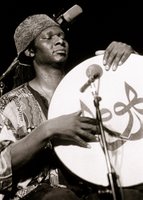
By Kurt Gottschalk - All About Jazz
Saturday, June 10, 2006
When Hamid Drake takes the stage at the Vision Festival on June 16th, the concert will be something of a signpost in the drummer's long career. It won't be, as many have assumed to be the case, the first time Drake has led a band. But it will be the first live appearance of Bindu, the first group he has led on record.
Drake has stepped up as bandleader as far back as the ‘80s, when he headed a group called Sama in Chicago. But as he became increasingly recognized outside his hometown—playing with Fred Anderson, William Parker, Peter Brötzmann and Ken Vandermark—time for leading his own group became hard to find.
”Over the years you think about a lot of things you want to do, but I'm very busy,” he said. “My time has been filled by supporting the projects of others.” That changed at the suggestion of the French record label RogueArt, which contacted Drake to lead a group for one of its inaugural set of releases. Drake immediately had a vision for a new band. “I knew that I wanted to work with five different elements and I knew I wanted a feminine presence,” he said.
As the project developed in his mind, he grew interested in pulling together a bi-city band, connecting two scenes in which he has found homes but which are often considered quite discrete. “It was a feeling of bringing together musicians from Chicago and New York and bridging this illusory gap,” he said.
The band will be an ongoing group, but not necessarily with a fixed membership, Drake said. “I want Bindu to be an ever-changing, expanding project,” he explained. “It can stay with the four saxophones or I can do something different. The whole concept of Bindu is to be able to adapt.”
The name Bindu comes from a Sanskrit word meaning “subtle point” and also refers to a sort of energy that was believed to reside in the body. The name follows Drake's long practice of referencing spiritual systems in his band names and vocal compositions. Sama came from the Arabic word for “to hear” and in Sufi tradition also refers to a gathering of dervishes to listen to music and implies “being able to listen in another sort of way,” Drake said. “It requires full-body and full-mind attention.” But that system of naming and referencing, he added, isn't just simple cultural appropriation, he explained. ”It's things that I actually believe in and practice,” he said. “I'm not trying to be cool. It's stuff that I practice in my everyday life. A lot of it's tied to Sufism and Buddhism.”
Drake's journeys in spirituality and improvised music date back about 50 years.
With all the projects, Drake is still searching for more inspiration and more partnerships. He said he hopes to build collaborations in East Asia and other parts of the world and continue finding musicians who share his visions of artistic expression and fulfillment.
”My hope is that more and more artists will use their music and art to extend compassion to all beings so we can take fuller participation in awakening our greater potential as human potential.”





No comments:
Post a Comment